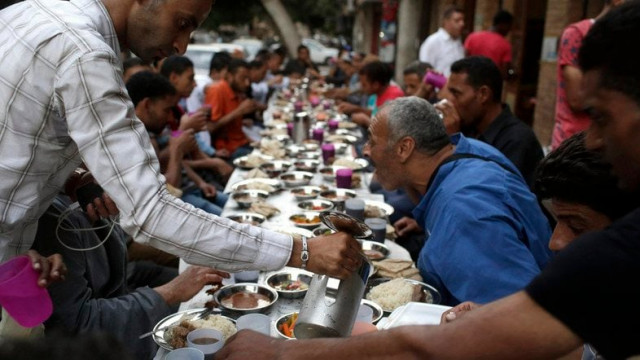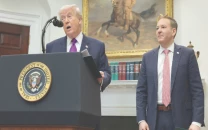Ramazan edict against eating in public infuriates some Muslims in Egypt
Edicts issued by Dar al-Iftaa are not legally binding but are given great importance when it comes to public conduct

People eat iftar, the breaking of fast meal, served for free on "charity tables" on a street during the first day of the holy month of Ramadan, in Cairo June 29, 2014. PHOTO: REUTERS
Edicts issued by the authority, Dar al-Iftaa, are not legally binding but are given great importance when it comes to governing public conduct.
However, this particular fatwa has provoked a tremendous outcry on Egyptian social media, with many criticising it as an attack on personal freedoms, also noting that there are many non-Muslims in Egypt who are not required to observe the fast.
Hindu man beaten for eating during Ramazan being pushed to ‘forgive and forget’
Famous broadcaster Youssef al-Hosiny was among those who criticised the move. He tweeted that the fatwa was “Daesh-like,” and said “that in a society like ours there is no need for such rules because Christians already respect Ramazan.”
https://twitter.com/Youssefalhosiny/status/739845318834040833
Ever since the ascension of President Abdel Fatah al-Sissi, grievances of Egypt’s religious minorities, who form 10 per cent of the population, have not been adequately addressed. Sissi has been criticised for his religious rhetoric and championing of traditional religious authorities.
Earlier this month, security forces shut down several cafes in the middle-class district of Dokki for serving people food publicly during fasting hours — another incident that also incited outrage.
6 religions other than Islam that require fasting
“Your state is a theocracy, although you constantly talk of a modern civil state,” Ibrahim Eissa, prominent columnist and usually pro-regime pundit criticised Sissi's government.
After being met with scathing criticism, Dar al-Iftaa removed the edict from its Facebook timeline.
This article originally appeared on Washington Post.



















COMMENTS
Comments are moderated and generally will be posted if they are on-topic and not abusive.
For more information, please see our Comments FAQ